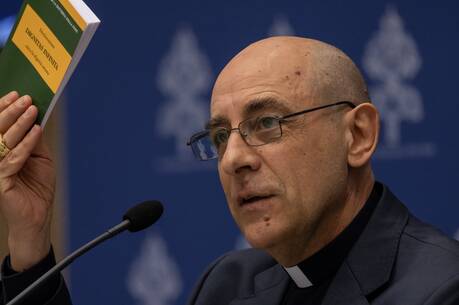Sin of the World
Slavery, it is said, was America’s original sin. In recent theological writing, it can also be described as a prime example of the sin of the world, a sin that runs through time and space infecting both persons and institutions. As a new exhibit at the New-York Historical Society shows, slavery reached out of the South to enrich northern trading centers like New York and Boston. Even after abolition, slavery’s legacy spawned segregation and racism.It is a welcome development, therefore, that political leaders are acknowledging the sins of our fathers. Four hundred years after the founding of Jamestown colony, the Virginia General Assembly has voiced its profound regret for the involuntary servitude of Africans and the exploitation of Native Americans. In events leading up to the bicentennial of the abolition of the slave trade, Prime Minister Tony Blair of the United Kingdom has twice expressed deep sorrow for his country’s role in the horrors of slavery. But others have yet to express their regret for participation in this primal evil. In Africa there is little discussion of the anniversary of abolition. One Ugandan journalist speculates that Africans’ reluctance to discuss the issue derives from the complicity of coast-dwelling traders in slaving wars against inland settlements. Likewise, many Latin Americans, overlooking their own history, tend to regard slavery and racism as North American evils. It is time that all sides acknowledge their participation in this sin of the world.
Lux et Veritas
Yale University was founded in 1701 in New Haven, Conn., as a college whose main purpose was to be the training of young men for ministry in the Congregational Church. Today, when Yale has become a famous research university, it has made a move that its 18th-century presidents could not have imagined. (Nor could they have imagined that three current America editors would have doctorates from Yale.)One of the university’s offices is that of university chaplain, a position held up till now by Protestant clergy. The March/April 2007 issue of the Yale Alumni Magazine notes that this summer Sharon Kugler, a Roman Catholic laywoman, will become the seventh university chaplain. She comes to this post from Johns Hopkins University, where she has been serving as chaplain since 1993. She is a graduate of Santa Clara University and holds a master’s degree in religious studies from Georgetown University.
In announcing the appointment of Ms. Kugler, Yale’s President Richard Levin, recalling that Yale’s roots are in the Protestant tradition, said a Protestant chaplain will be named to minister to Protestants at Yale, just as Rabbi James Ponet currently serves as Jewish chaplain and the Rev. Robert L. Beloin serves the Catholic community. Father Beloin is director of the St. Thomas More Catholic Center and Chapel, built by the Thomas More Association established in 1937 for Catholic students at Yale. Ms. Kugler is experienced in interfaith dialogue and says that her nonordained status will be an advantage in dealing with people of different faiths. As a layperson, she told the alumni magazine, I’m everyone’s chaplain and no one’s clergy.
Eco-Damage at the Border
Like rapidly spreading kudzu, the growth of security measures is threatening habitats and wildlife along the U.S.-Mexican border. A new report by the Environmental Protection Agency’s Good Neighbor Environment Board observes that efforts to tighten border security have created a heavy environmental footprint in their wake. The Department of Homeland Security has built roads and expanded its use of all-terrain vehicles, as well as low-flying helicopters and new lighting systems. Together with the partially completed wall along the border, such measures have put fragile habitats at risk and are even causing shifts in animal migratory patterns. Undocumented immigrants, too, have created new footpaths and vehicle trails through otherwise untouched landscapes.The report cites the Cabeza Prieta National Wildlife Refuge in Arizona as one of the 10 most endangered wildlife refuges in the nation, in part because of these reasons. The same is true of the Organ Pipe Cactus National Monument. Together they encompass, according to the Defender of Wildlife organization, over a million acres of desert wilderness that are home to an array of imperiled wildlife, such as jaguars, desert bighorn sheep and desert tortoises.
The Good Neighbor Environment Board urges greater collaboration between security and environmental agencies on both sides of the border and recommends that instead of building new roads and barriers and expanded use of all-terrain vehicles and similar measures, attention be given to other methods of border security. Current efforts not only damage the border environment, but also drive immigrants into desert and mountain areas where hundreds die yearly from exposure. The overall harm, human and environmental, again points to the need for comprehensive immigration reform.







